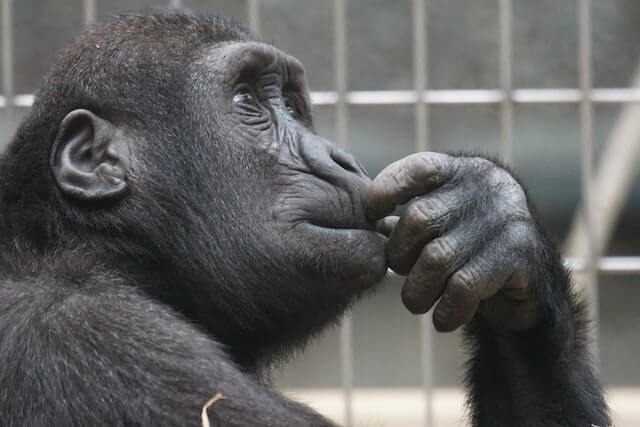
The relationship between humans and animals has been one of fascination and companionship throughout history. We share our lives with a myriad of animal species, from our beloved pets to the awe-inspiring creatures that roam the wild. Over time, our curiosity about the inner workings of their minds, their intelligence, emotions, and social behaviors has driven researchers to explore the realm of animal cognition, ethology, and animal psychology. In this in-depth blog post, we embark on an enlightening journey to delve into the intricate world of animal thoughts, emotions, and problem-solving abilities.
The Complexity of Animal Cognition
- Animal Intelligence: More Than Instincts
The traditional belief that animals operate solely on instincts has been challenged by a wealth of scientific evidence suggesting otherwise. Researchers have conducted numerous studies that demonstrate animals’ remarkable cognitive abilities and problem-solving skills.

For instance, in a classic experiment, chimpanzees were shown to solve complex puzzles to obtain rewards, showcasing their cognitive prowess. Similar studies involving dolphins, elephants, and other animals have consistently revealed their capacity for learning, adaptation, and even creativity.
- Communication Among Animals
Communication is the backbone of any society, and the animal kingdom is no exception. Various species have evolved intricate communication systems to convey information vital for their survival and social cohesion. From the melodic songs of birds and the dances of honeybees to the sophisticated gestural communication of primates, animals employ an array of vocalizations, body language, pheromones, and visual displays. The study of these communication methods sheds light on the evolution of complex behaviors and the ways animals interact with one another.
- Animal Senses and Perception
The sensory adaptations of animals are as diverse as the species themselves. Each creature perceives the world through a unique lens tailored to its ecological niche. For instance, bats rely on echolocation to navigate and locate prey, while dogs possess an acute sense of smell capable of detecting scents undetectable to humans. By understanding the sensory abilities of animals, we can gain insights into their behaviors and the fascinating ways they perceive and interact with their environment.
Emotions in the Animal Kingdom
- Unraveling Animal Emotions
The question of whether animals experience emotions has been a subject of debate for centuries. Modern research, however, has provided compelling evidence that animals do indeed feel a wide range of emotions, including joy, fear, anger, and grief. For example, elephants have been observed mourning the loss of their deceased herd members, displaying a depth of emotional complexity previously thought to be exclusive to humans. Understanding animal emotions enriches our appreciation for their individuality and helps us form more empathetic connections with them.
- The Human-Animal Bond
The emotional bond between humans and animals is profound and has been shown to have significant benefits for both parties. Pets, in particular, have a unique ability to provide companionship, reduce stress, and even improve mental and physical health in their human caregivers. Research on the human-animal bond highlights the emotional and psychological support animals offer, making them valuable members of our families and communities.
- Empathy Among Animals
Empathy, often regarded as a human trait, is now recognized as existing in various animal species as well. Instances of animals showing empathy towards conspecifics and even different species have been documented in scientific studies. From dolphins rescuing stranded individuals to bonobos consoling distressed group members, such examples challenge the notion that empathy is solely a human attribute. Understanding empathy in animals further emphasizes the shared emotional connections we have with them.
Also Read Decoding the Triggers Behind Dog Bites and Promoting Safer Interactions
Ethology and Animal Social Structures
- Studying Animal Behavior: The Field of Ethology
Ethology, the scientific study of animal behavior, plays a crucial role in unraveling the mysteries of animal minds and social structures. Researchers in this field observe animals in their natural habitats to understand their behaviors, interactions, and adaptations. Ethological studies have unveiled astonishing insights into animal communication, mating rituals, parental care, and territorial behavior.
- Social Hierarchies in the Animal Kingdom
Many animal species, such as wolves, elephants, and primates, live in complex social structures with well-defined hierarchies. These hierarchies influence mating systems, resource access, and conflict resolution within groups. Ethological research has shown that social hierarchies are dynamic and can change based on factors like age, experience, and individual relationships. Understanding these hierarchies is crucial to comprehending the functioning of animal societies and their collective decision-making processes.
Animal Minds and Problem-Solving
- The Curious Case of Tool Use
Tool use was once believed to be a trait unique to humans. However, researchers have discovered numerous instances of animals using tools to their advantage. For example, New Caledonian crows are known for crafting and using tools to extract insects from tree bark, demonstrating their impressive problem-solving abilities. Understanding tool use in animals offers insights into their capacity for innovation and adaptation.
- Problem-Solving Abilities
Animals encounter a multitude of challenges in their natural environments, from locating food to escaping predators. To survive and thrive, they must utilize their cognitive abilities to solve problems and overcome obstacles. Observing animals tackling puzzles and overcoming hurdles provides invaluable information about their intelligence, learning processes, and adaptive behaviors.

Institutions where Ethology can be taken up for studies in the USA
Ethology is typically offered as a specialized area of study within broader fields such as biology, zoology, or psychology in universities and colleges across the USA. Here are some renowned institutions known for offering ethology-related courses or programs:
- Harvard University – Cambridge, Massachusetts
- University of California, Davis – Davis, California
- Cornell University – Ithaca, New York
- University of California, Berkeley – Berkeley, California
- University of Wisconsin-Madison – Madison, Wisconsin
- University of Washington – Seattle, Washington
- Duke University – Durham, North Carolina
- University of Michigan – Ann Arbor, Michigan
- University of Arizona – Tucson, Arizona
- University of Florida – Gainesville, Florida
Please note that the availability of ethology courses or programs may vary among different institutions and might be offered under different department names, such as “Animal Behavior,” “Behavioral Ecology,” or “Comparative Psychology.” It is recommended to check the specific course catalogs and departments of these universities for the most up-to-date information on ethology-related offerings.
Conclusion
Exploring the minds of our animal friends has revealed an astonishing depth of intelligence, emotions, and problem-solving abilities. As we continue to delve into the complex world of animal cognition, ethology, and psychology, our understanding of these remarkable creatures grows, fostering greater respect and compassion for all living beings on our planet.
This knowledge not only enhances our bond with our beloved pets but also reinforces the importance of conservation efforts to protect the diverse array of creatures that share our world. May our journey of exploration and discovery lead us to a more harmonious coexistence with our fellow animals and a deeper appreciation for the wonders of the animal mind.



